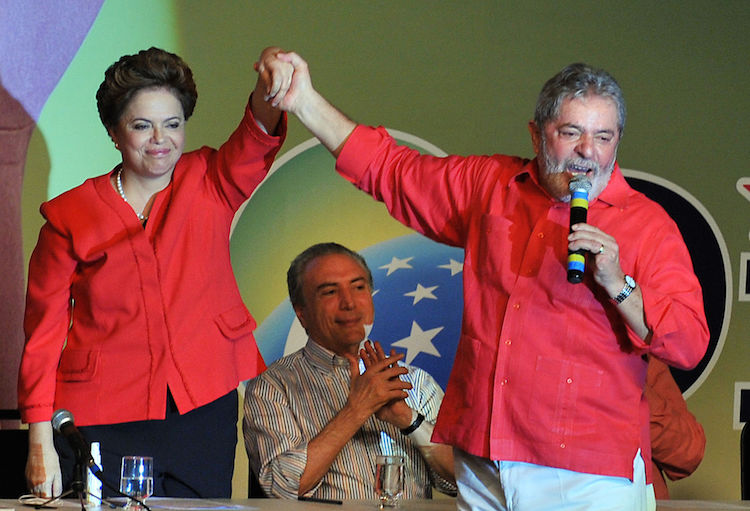Viewpoint by Jonathan Power
LUND, Sweden (IDN | INPS) – The Brazilians have an elected president. They must keep her. If Dilma Rosseff is pushed to resign democracy has failed.
Two years ago she won re-election handsomely. That is the source of her mandate. From that she derives her legitimacy. The only thing that could topple her is if hard evidence emerges that she is crook- in her case supposedly stole millions of dollars from the Brazilian oil giant, Petrobras, of which she was once head of the board. Then Congress would be within its rights to discuss her impeachment.
But there is no evidence of her personal corruption – although there is evidence aplenty that her party, The Workers’ Party, has received a lot of black money, not just from Petrobras.
Brazil is not a parliamentary democracy. It is not necessary for her to have a majority in parliament to rule, anymore than Barack Obama does in the U.S. Congress. Unlike in, say the UK or Denmark, if members of parliament withdraw support for a head of government he/she does not fall.
Nevertheless, the Economist, a long-time supporter of democracy, argues in its latest issue she should resign, ignoring the rules of democracy, even though it admits impeachment would be wrong and even though her only “crime” is to have mishandled the economy.
Both she and her widely loved predecessor, Luis “Lula” da Silva, the charismatic, working class union leader, lived in cloud-cuckoo-land, convinced the commodity boom in the world’s ninth largest economy would continue forever. Many observers knew the Chinese miracle would come to an end eventually. Many informed people knew an economy based on soya, beans, meat, fruit and metal and forestry exports, much of which was sold to China, was a precarious one. The two of them ignored the warning signs.
This was a particular Brazilian problem. Other Latin American countries also suffered from the fast fall in the commodities’ markets but not one other one has got minus growth as has Brazil (and Venezuela, a special case). Look at Peru, Chile, Nicaragua and Mexico, four countries still doing well, the first three socialist.
Ironically, the earlier success of the Lula and Rousseff governments is that, because of fast economic growth, they created a much larger middle class who now have middle class concerns. They see their hard won new standards of living being fast eroded. Thus they are more susceptible to supporting the legal manoeuvrings now besetting the president.
For many voters it is the accusations against Lula that most concern them. He has been accused of owning an expensive beach-front property and another countryside house. He says they are not his and they belong to a construction company. His main home remains in a working class neighbourhood in Sao Paulo.
If we are sensible about the issue, an ex-president on a good pension, with much saved up legitimately from the time he was in office, having a sea-front flat (if he does) is no great deal. The president’s salary, pension and benefits are quite high. Property prices outside Sao Paulo and Rio are low. Even this not-very-well paid journalist could sell his modest flat in Sweden and with the money buy a rather nice, bigger, one in Brazil overlooking the beach.
Let’s go back to how Lula first won election. After centuries of favouring the middle and upper classes in a country that had one of the worst distributions of income in the world the Workers’ Party turned the tables. Middle class people with a conscience joined the working class and the rural peasantry in voting for its presidential candidate four times.
Whatever Lula’s and Rousseff’s mistakes in ignoring warning signs that the commodity boom could not last they wanted to make hay while the sun shone for the poor – those who had missed out during the last 100 years of good economic growth.
They did – with great success, as an earlier issue of the now critical Economist records.
The greatest steps forward were made by Lula, in particular his pioneering Bolsa Familia in which the woman in the family received a monthly cash hand out as long as the parents placed their children in school and took them to a health clinic regularly. This lifted 36 million people out of poverty.
The World Bank reckons that Brazil cut “chronic poverty” by three quarters from 2004 to 2012 to just 1.6% of the population. The figure is now certainly lower. The income of the poorest tenth has more than doubled.
In the three years after Rousseff came to office in 2010 the government installed 670,00 water tanks for the poor across the country. She has also increased subsidized housing and vocational training. She has expanded Bolsa Familia.
All this progress could come to an end if Rousseff falls on her sword. She mustn’t. [IDN | INPS – 6 April 2016]
Note: Jonathan Power syndicates his opinion articles. He forwarded this and his previous Viewpoints for publication in IDN-INPS.
Photo: Dilma Rousseff with Lula during the 2010 presidential campaign. Credit: Wikimedia Commons
Copyright: Jonathan Power
IDN is flagship of the International Press Syndicate.

